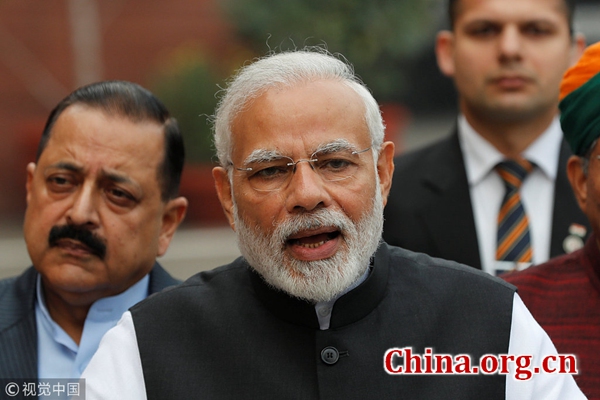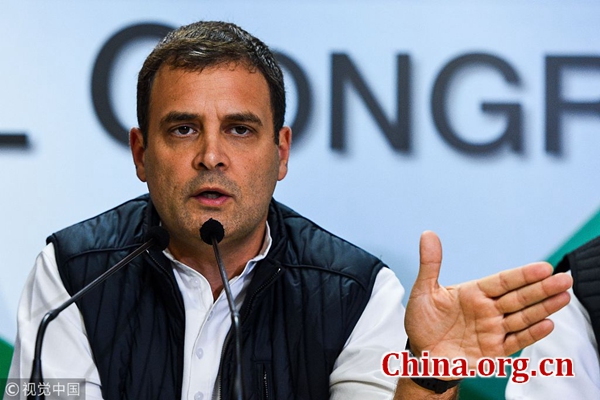BJP losses create new situation for India's 2019 elections
- By Niranjan Sahoo
 0 Comment(s)
0 Comment(s) Print
Print E-mail China.org.cn, December 16, 2018
E-mail China.org.cn, December 16, 2018

Voters in five key states delivered a decisive blow to Indian Prime Minister Narendra Modi's Bharatiya Janata Party (BJP). The once invincible pro-Hindu party under Modi's charismatic leadership received a huge jolt when the main opposition Indian National Congress made an astonishing comeback, wresting three heartland provinces – Madhya Pradesh, Rajasthan and Chhattisgarh – from the BJP.
These heartland provinces had delivered more than 90 percent of their seats to the BJP in its epic 2014 national election win. Fought on the issues of rural distress, particularly the agrarian crisis, jobs, identity politics and the performance of incumbent chief ministers, the five state elections were dubbed a "semi-final" before next April's general election.
According to analysts and political commentators, the outcome of the provincial elections keeps the game open for the general elections in early 2019. Not so long ago, the BJP had looked invincible. The right-wing party that was once restricted to Hindi speaking states on North and some western provinces made a spectacular rise once Modi took the party helm mantle in 2014.
Combining with the image as an unapologetic Hindutva leader (his followers fondly address him as "Hindu Hriday Samrat," or empowering force of Hindutva), incorruptible, an able administrator, strong leader and pro-growth politician who had turned coastal Gujarat state (where he served as chief minister for 13 years) into a top investment destination in the country, Modi was instrumental in helping his party to reap the electoral whirlwind in many states where the BJP had previously little presence.
Together with its allies, the BJP gained power in 19 of the 29 states, a feat that had once appeared impossible for the Hindu right.
The saffron party's phenomenal spread introduced an almost existentialist threat for the main political opposition, and even more so for many regional parties. Consequently, most opposition parties, led by the National Congress, began frequent meetings to explore the idea of forming a joint opposition front against the BJP in the forthcoming national poll.
Recently, as many as 19 opposition political parties met to form a broad coalition for this purpose. However, there were constant doubts among them whether a weak Congress Party could effectively lead the rest against Modi's formidable election machine and proven leadership. Its strong comeback in heartland states seems have answered their doubts.

Yet, it's not going to be that easy for the Congress and its potential allies. Firstly, the Tuesday vote involved provincial and not a national election. Given his skills and leadership experience, Modi still stands taller than any rival. The opposition leader, Rahul Gandhi, despite the charismatic family name and notwithstanding this week's successes, would be no match for Modi's broad connection with the voters after the BJP's phenomenal success under his leadership.
Second, despite very handsome gains Congress made in key northern states, the 133-year-old national party remains shambolic in many states. It lacks resources, cadres, a critical electoral infrastructure to revive the party's fighting chance in 2019.
Third, despite the election results coming as a rude jolt for the ruling party, it will learn quickly from the debacle and make rapid course corrections before the general election. Importantly, the government still holds power in 16 states and has massive advantages over the united opposition in terms of wooing voters with goodies and attractive schemes.
Finally, questions of leadership and possible stability of the united opposition will play on the minds of voters. India has been witness to many ragtag coalition parties coming to power and then collapsing before the end of their tenure. This will surely help Modi to manage the narrative more effectively than the opposition. With India's parliamentary elections increasingly fought in the Presidential style, Modi will still have the upper hand in 2019.
Yet, those who have following the country's political developments for a long time know Indian voters often throw surprises like the one they delivered the other day. Overall, the outcome of state-level polls potentially leaves next April's vote open for anyone to grab control. Both the ruling party and the united opposition have to raise their game to be counted by the smart Indian voters.
Niranjan Sahoo is Senior Fellow, Observer Research Foundation, New Delhi.
Opinion articles reflect the views of their authors only, not necessarily those of China.org.cn.






Go to Forum >>0 Comment(s)